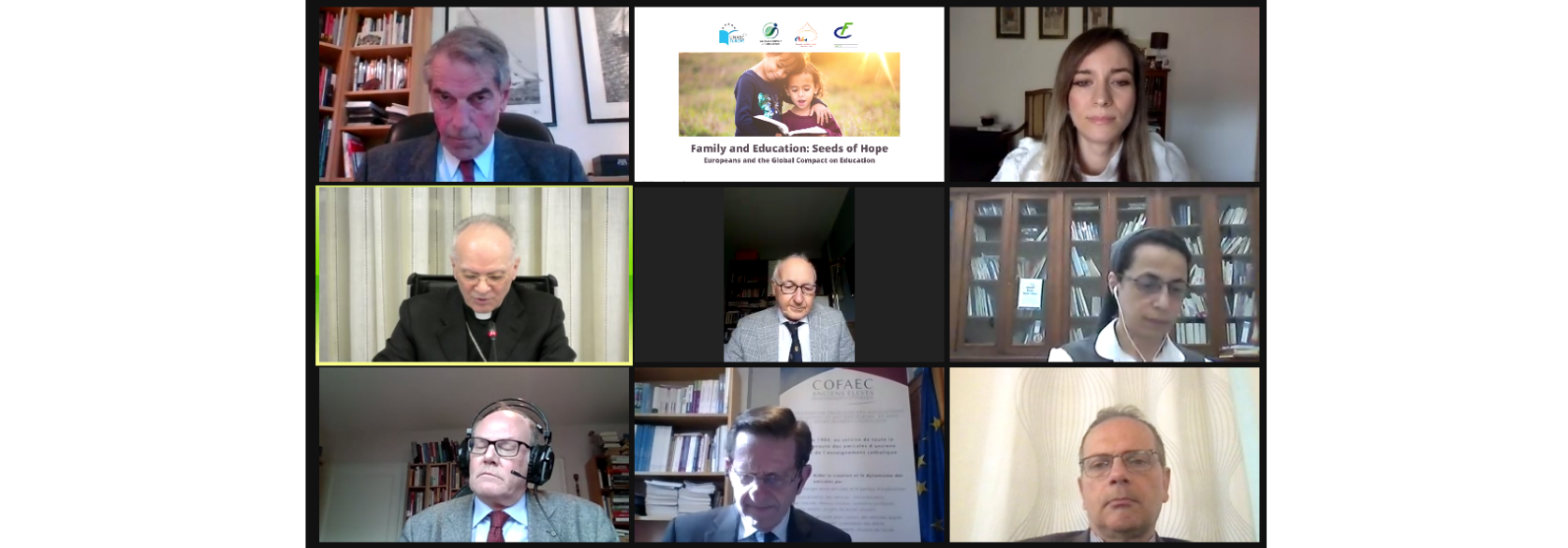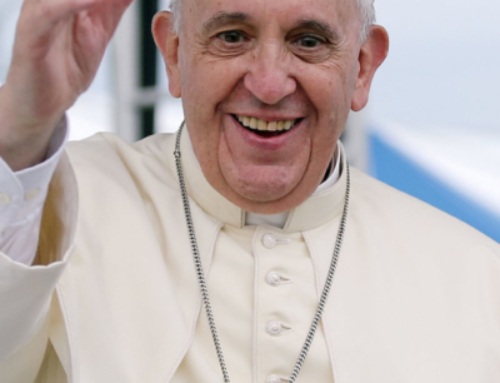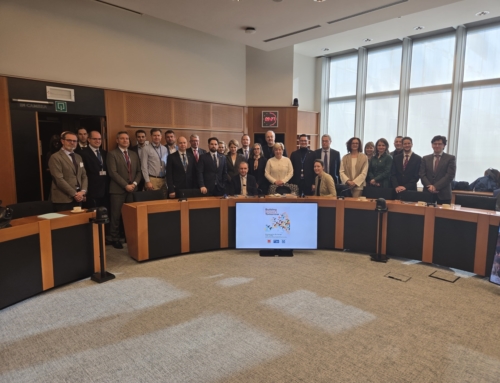Family Associations and Former Students Commit Themselves to the Global Compact on Education as Proposed by Pope Francis
Brussels, 6th of May 2021,
On Tuesday, the 4th of May 2021, FAFCE and the European Union of Former Catholic School Students (UNAEC-Europe) jointly hosted a webinar entitled “Family and Education: Seeds of Hope”.
FAFCE’s Honorary President, Antoine Renard, opened the webinar by speaking about the role of families in education. Without the commitment of families, he said, education does not have the full effect. Mr Renard cited the saying “education is man’s maturity before God” and highlighted the importance of ensuring that education has a moral dimension that empowers students to face down and prevail over the challenges—and even disasters—that they will encounter in their lives. He tied this aspect of education into Pope Saint John Paul II’s Charter on the Rights of the Family which he considers an important guiding light for all family associations to follow.
Mgr Vincenzo Zani, Secretary for the Holy See’s Congregation for Catholic Education, outlined the Global Compact on Education and the role of parents in realising children’s abilities to their full potential. A central element of Monsignor Zani’s intervention was the importance of education in equipping all members of a community with knowledge that can constitute a common reference point, which, he stressed, allows people to engage with others beyond their own lived experience and so expand their engagement. Moreover, in working toward this fuller engagement, education narrows the gap not only between individuals but also between man and God.
Mr. Sjur Bergan, Head of the Education Department at the Council of Europe, discussed the educational challenge for Europe. His presentation emphasised the importance of ensuring quality education while taking pains to qualify the definition of quality. According to Mr. Bergan, a quality education in a democratic society imparts skills specific to a life in a democratic society. This requires a commitment on the part of educators to teach their students the importance of ethics, transparency, and integrity as safeguards against corruption, which destroys from within the institutions and individuals engaged in it. To do so, Mr. Bergan called for a robust education in language and history, so that students learn to communicate with clarity and to avoid the mistakes of the past.
Sister Myrna Farah, the Director of Institute “Saint-Anne”– also known as the Sisters of Besancon—in Lebanon, delivered a presentation on the complementary relationship between families and schools. She rejected theoretical abstractions and focused on the implications of a concrete problem: Lebanese schoolchildren have had to trade in-person education for extended confinement since March 1st, 2020. This unfortunate situation manifested the complementary relationship between families and schools as the former had to take on the traditional responsibilities of the latter. As a result, Sister Farah’s presentation reflected on an important question: how to strengthen and energise the complementarity between families and schools? She advocated for an approach based on five “Co-”s: co-responsibility, co-education, communication, collaboration, and courage. This approach will transform the relationship between families and schools from a dynamic of co-existence to one of co-education.
FAFCE’s President, Mr Vincenzo Bassi, highlighted the communal aspect of education. He laid out a mission for the assembled attendees, saying “We need to build an alliance of partners so that we can build a community—schools are communities just as family organisations are communities.” In doing so, Mr. Bassi said, Catholic schools can avoid imposing ideology and instead empower students to stand together and take care of each other on the basis of common values. This process is the antidote to loneliness, which he calls “the greatest sickness.” This work begins in the family home, where parents have not only the privilege of training their children, but also the joyful responsibility of doing so.
Laurent Gregoire, President of the French Confederation of Catholic Education Alumni (COFAEC), fleshed out the duties incumbent upon alumni associations. He described their main objectives as creating and protecting networks of relationships that can continue to support students, emotionally and financially, well after their graduation. Too often, he said, alumni associations neglect their unique capacity to encourage the holistic training of alumni and the promotion of family engagement in society and politics. This creates a space in which alumni can participate in the life of their schools and act according to the principle of solidarity.
Mr Giuseppe Mariano, the President of UNAEC-Europe, spoke to the key role alumni play in shaping the life and values of their schools and issued a call to deeper commitment therein. He admonished schools for failing to inculcate the transcendent purpose of education. As he put it, no less than “the humanisation of the world” is the true purpose of education. In order to achieve this humanisation, institutions must build new alliances built on the values of peace, citizenship, solidarity, development, and dignity. Otherwise, they might struggle to realise their common objectives and to fulfill their mandate of promoting a fresh vision of humanity.
Even the briefest consideration of the interventions made during the webinar will manifest the common themes of solidarity and co-responsibility. Education occupies so prominent a role in society because it is where children learn to become responsible citizens, courageous individuals, and effective agents of humanisation. In a world haunted by the COVID-19 pandemic and threatened by ideological impositions, families must step forward to take on a more active role in their children’s education. A stronger alliance between families and schools will prove instrumental in preserving the transcendent vision of education evident in Catholic Social Teaching and reiterated by Mr Mariano. As Mr Bassi said in his intervention, “We must oppose values born of ideology because all they do is turn people against each other.”
You can view the full video here.







